The Eagle Has Eyes
LATINOS IN THE UNITED STATES SERIES
SERIES EDITOR
Rubn O. Martinez, Michigan State University
EDITORIAL BOARD
Adalberto Aguirre Jr., University of CaliforniaRiverside
Robert Aponte, Indiana UniversityPurdue University Indianapolis
Teresa Cordova, University of Illinois at Chicago
Julie Leininger Pycior, Manhattan College
Rogelio Saenz, University of TexasSan Antonio
Copyright 2019 by Jos Angel Gutirrez
 The paper used in this publication meets the minimum requirements of ANSI/NISO Z39.481992 (R 1997) (Permanence of Paper).
The paper used in this publication meets the minimum requirements of ANSI/NISO Z39.481992 (R 1997) (Permanence of Paper).
Michigan State University Press
East Lansing, Michigan 48823-5245
Printed and bound in the United States of America.
28 27 26 25 24 23 22 21 20 19 1 2 3 4 5 6 7 8 9 10
LIBRARY OF CONGRESS CATALOGING-IN-PUBLICATION DATA
Names: Gutierrez, Jose Angel, author.
Title: The eagle has eyes : the FBI surveillance of Csar Estrada Chvez of the United Farm Workers Union of America, 19651975 / Jose Angel Gutierrez.
Description: East Lansing : Michigan State University Press, [2019] | Series: Latinos in the United States | Includes bibliographical references and index.
Identifiers: LCCN 2018020123| ISBN 9781611863079 (pbk. : alk. paper) | ISBN 9781609175863 (pdf) | ISBN 9781628953503 (epub) | ISBN 9781628963502 (kindle)
Subjects: LCSH: Chvez, Csar, 19271993. | United Farm Workers. | United States. Federal Bureau of Investigation. | Domestic intelligenceUnited StatesHistory20th century. | Labor unionsPolitical activityUnited StatesHistory. | Civil rightsUnited StatesHistory20th century. | United States Politics and government20th century.
Classification: LCC HD6509.C48 G88 2019 | DDC 331.88/13092dc23
LC record available at https://lccn.loc.gov/2018020123
Book and cover design by Charlie Sharp, Sharp Des!gns, East Lansing, MI
Cover art is Huelga, 1970s, The United Farm Worker (UFW) Collection: Poster & Graphics, #31870.
Walter P. Reuther Library, Archives of Labor and Urban Affairs, Wayne State University.
Michigan State University Press is a member of the Green Press Initiative and is committed to developing and encouraging ecologically responsible publishing practices. For more information about the Green Press Initiative and the use of recycled paper in book publishing, please visit www.greenpressinitiative.org.

Visit Michigan State University Press at www.msupress.org
TO ALL OF US WHO HAVE BEEN THE TARGET OF SURVEILLANCE BY LOCAL, state, and federal governments (U.S. and Mexico) over the years. To those who have not escaped that vigilance, entrapment, character assassination, dragnets, and have been or still are incarcerated or in exile. And to those among us, the fortunate ones, who have remained unindicted, not convicted, and unjailed for any length of time.
I can only imagine what greater successes at fundamental social change we could have achieved but for the counterintelligence operations of governments that viewed us as subversives because we opposed their governance, their policies, and only sought a better quality of life. They used the peoples resources illegally to enhance their police power and thwart our every move.
To my wife, Natalia Verjat, and our blended children, Adrian, Tozi Aide, Olin Roldan, Avina Cristal, Lina Maria, Andrea Lucia, Clavel Amariz, Ian Scott, Nadia Gabrielle, Alan Jude, and Mara Isabella. Thank you all for putting up with me: the piles of books, FBI files in boxes everywhere, my daily grumpiness, and not paying enough attention to your needs and wants during the years of research and manuscript production.
To the Next Generation of Activists, including my most recent grandchildren, Analee Lynne Rotolo and Lucia Luna Price: Be prudent with internet connectivity; watch out for the hegemonic power of technology over your lives; learn new tactics and strategies to protect your privacy; and cope with your paranoia. They are watching and listening to you.
I AM MOST GRATEFUL TO ALL WHO HAVE HELPED ME GATHER DOCUMENTS dating back to 1976 and the Free Ramsey Muiz campaign, which led us to the Freedom of Information Act (FOIA). We found a treasure trove of redacted FBI documents, but documents nonetheless, on ourselves and the Chicano Movement. And more documents with the Internal Revenue Service (IRS), which audited me every year in the 1970s while I served as board president of the Crystal City Independent School District; later as county judge for Zavala County, Texas; and founder and national president of the Raza Unida Party. I thank them because I learned then that there were intelligence agencies in existence other than the Federal Bureau of Investigation (FBI) and the Central Intelligence Agency (CIA), such as the IRS and the NSA, for example.
Over the years, many others have shared their documents with me, beginning with Harry Ring (now deceased), longtime writer and activist with the Socialist Workers Party (SWP). Their case against the FBI for release of withheld documents remains the longest litigated battle by citizens suing their government for spying on them, thirty-five years. There were many others.Mauricio Mazon provided copies of military intelligence files on the West Coast military and the police, state and local, from San Diego to Los Angeles. Rodolfo Acua shared his Red Squad file, aka Los Angeles Police Intelligence Unit, collected by an informant in his classes at California State UniversityNorthridge. Ernesto Vigil, Richard Romero, and John Haro, all high-level members of the Crusade for Justice in Denver, have given me many records on that organization, themselves, and its leader Rodolfo Corky Gonzales. An anonymous source gave me the files gathered and held by the Mexican government on my activities during the years I maintained relations with various Mexican presidents and other influential people in Mexico. Yolanda Garza and Walter Birdwell let me copy their FBI files; both were active in the Mexican American Youth Organization in the Houston area. Reies Lopez Tijerina, one of the Four Horsemen of the Chicano Movement, as Matt Meier and Feliciano Rivera (later Ribera) termed us, let me copy his FBI file.
I also thank the graduate students in my classes and conference attendees who sat in on my lectures and presentations utilizing these documents over the years. They posed questions and analyzed content with different lenses that have made my own views and interpretations clearer. On more than one occasion they saw things in the files I missed.
My deep gratitude goes to Rubn Martinez, director of the Julian Samora Research Institute at Michigan State University, who took an interest in my work and did some fine editing of the draft manuscript. He afforded me time and resources to spend writing this book. I also thank Ernesto Vigil for his work and views on the subject. I dare say he is the most knowledgeable scholar on the surveillance of Chicanos, Mexicans, and Native Americans. And, thank you Bonnie Cobb for your careful copyediting and Michigan State University Press for publishing my analysis of these documents.
Rubn Martinez
CSAR E. CHVEZ WAS A REMARKABLE MAN. LIKE FEW OTHERS, HE ROSE from poverty to have great political influence on the American consciousness and the nations institutions. He led the building of a powerful farmworker organization, the United Farm Workers of America (UFW), influenced statewide elections in California, and directly challenged the power of federal agencies, local law-enforcement officials, and decisions by the courts. The younger generations of Americans may know about his nonviolent ideology, the nationwide boycotts of nonunion grapes and lettuce, his hunger strikes, and the 340-mile march from Delano to Sacramento, California, in 1966. Those who are older may remember Chvez breaking bread with Senator Robert Kennedy to end a 25-day fast in 1968. They are not likely, however, to know about the struggles with the growers in California and Texas; the repeated violence against him, union members, and supporters who joined him on the front lines; and the bitter struggle with the Teamsters Union. And, least known of all is how the Federal Bureau of Investigation (FBI), the nations most powerful internal security and law enforcement agency, tracked and monitored Chvezs movements and the unions activities, allthe while taking a hands-off approach toward the perpetrators of violence against the unions leadership, members, and followers.

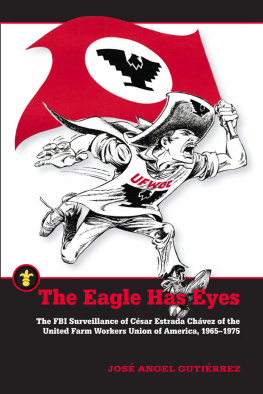
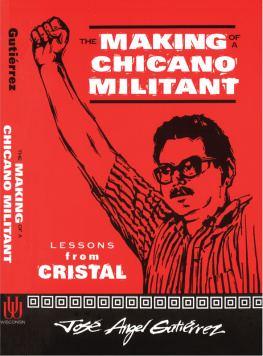

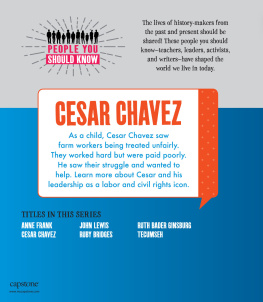
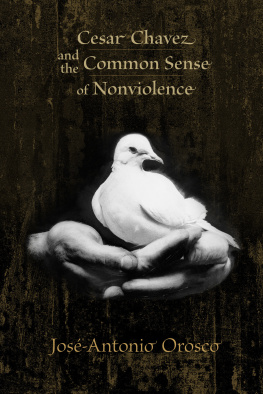
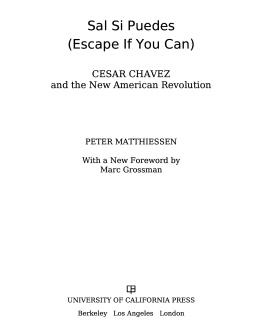
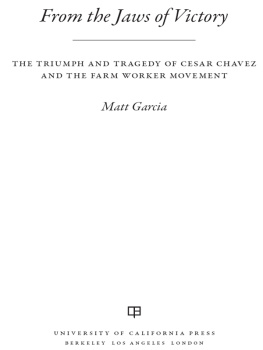

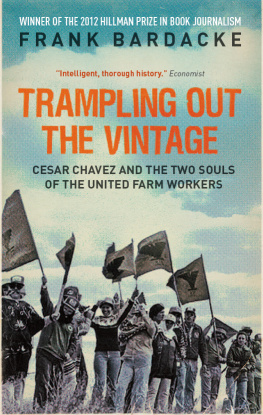
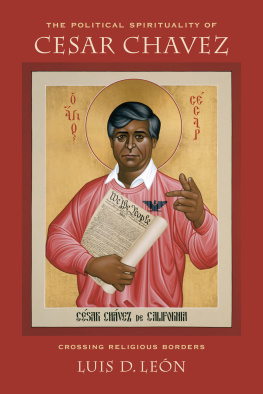
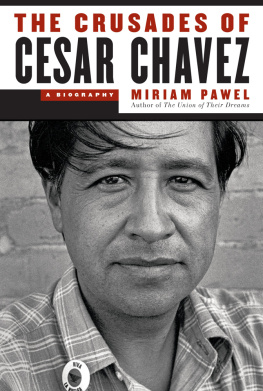

 The paper used in this publication meets the minimum requirements of ANSI/NISO Z39.481992 (R 1997) (Permanence of Paper).
The paper used in this publication meets the minimum requirements of ANSI/NISO Z39.481992 (R 1997) (Permanence of Paper).